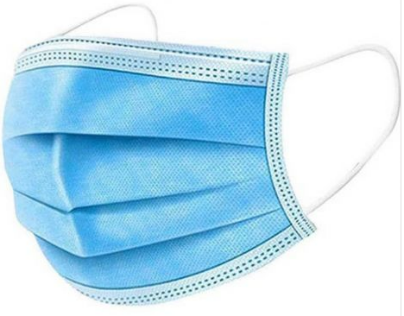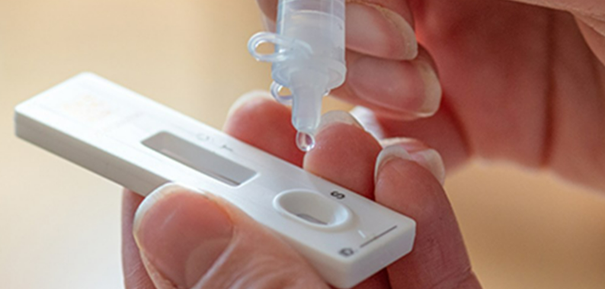Living with COVID-19 Bulletin: Thursday 23 June
June 23, 2022
COVID-19 has tested the resolve of colleagues across the NHS and continues to impact services, however it is clear that we now need to plan for the long term and change our approach to dealing with COVID-19.
On Monday 20 June we moved to our next stage of stepping down more of our restrictions to ensure that our response remains reasonable and proportionate to the risk.
We continue to monitor the situation to ensure we keep our patients, visitors and colleagues safe.
1. New: Rise of COVID-19 cases may see return of mask wearing
 As you may be aware, there has been a rise in the number of COVID-19 cases within our community and we are seeing an increasing number of people testing positive in our hospitals.
As you may be aware, there has been a rise in the number of COVID-19 cases within our community and we are seeing an increasing number of people testing positive in our hospitals.
For now we are keeping our current IPC guidance in place, but we will review this regularly based on the number of cases, outbreaks and staff absences with the virus.
This does mean that we may need to return to mask wearing for colleagues working within clinical areas to keep everyone safe.
If it is decided to take this course of action, we will alert all colleagues.
But in the meantime, please follow our current IPC guidance and remain vigilant. Colleagues are reminded that they can choose to wear fluid-repellent surgical masks (FRSMs) in all areas if they choose.
Below is a reminder of situations when masks are required:
- Masks still to be accessible for those who choose to wear them or when mask wearing is in-line with an individual risk assessment.
- Masks should be worn when caring for a COVID-19 confirmed or suspected positive patient alongside PPE appropriate to the task being undertaken. This includes within the side room where there is a COVID-19 positive patient (not within the rest of the ward if patients have not tested positive for COVID-19) and within a red ward.
- Respiratory care pathways/wards (including wards with outbreaks of respiratory infection).
- Areas where there are untriaged patients whose COVID-19 status is unknown such as A&E, Urgent Treatment Centre and primary care (GP practices).
- Haem-oncology wards such as SCAT, D12, Medical Infusion Suite.
- Renal wards.
- When undertaking an Aerosol Generating Procedure (AGP) and patient is of unknown status or COVID positive then a FFP3 fit tested mask should be worn.
- Where there are outbreaks of COVID-19 or respiratory outbreaks such as flu.
- Ensure appropriate mask/PPE selection in line with the task that is being undertaken or as required to support transmission-based precautions.
Masks no longer need to be worn in the following areas, unless it is the staff member’s preference or requested to do so by a patient or staff member:
- Clinical areas apart from those listed above.
- Non-patient facing areas such as laboratories, education centres and offices.
- Corridors and other public areas.
- Outpatients.
Wearing of Masks – Patients:
- Patients with no respiratory symptoms including in outpatient clinics and waiting areas are no longer required to wear a surgical mask.
- Suspected or confirmed COVID-19 patients should be offered a mask if clinically able to tolerate on admission and on transfer to other clinical areas.
2. New: City COVID vaccination hub to reduce opening hours
From Monday 27 June, the COVID vaccination hub at City Hospital will no longer be open Monday to Friday. Instead, colleagues can visit a daily pop-up clinic in the Birmingham Treatment Centre and other pop-ups around the Trust sites, including at Sandwell, Rowley and within the maternity department at City. More details on timings for these will be shared through the daily bulletin.
The City Hospital vaccination hub will remain open at weekends between 9am-5pm for five to 17 year-old patients for both walk-ins and booked appointments, by calling 119.
3. New: What to do if you’re in contact with a positive COVID-19 case and not wearing a face mask
Due to the step down of surgical face masks in some wards and areas, colleagues should follow the below actions if they’re not wearing a face mask and have contact with a positive case of COVID-19.
- Daily lateral flow test to be taken for seven days
- Fluid resistant surgical masks to be worn for seven days
Note: If an inpatient is has had contact with a positive colleague who was not wearing a face mask, they would also be a contact and would need to be monitored for symptoms and lateral flow tested daily.
4. Reminder: Visiting/attending appointments
Our current visiting arrangements are to continue as followed:
- Patients can now receive up to two visitors per day for one hour. A child can attend as one of the two visitors and remains the responsibility of the parent/guardian.
- Visiting appointments must continue to be booked with the ward, as they are currently. Visiting hours are between 11am–7pm.
- Patients attending the Emergency department or outpatient clinics can be accompanied by a visitor.
- Visitors are asked to refrain from attending sites even for appointments if they are unwell and experiencing COVID-19 symptoms.
- Visitors are no longer required to wear masks with the exception of high-risk areas such as haem-oncology, respiratory care wards, neonatal and where confirmed/suspected patients are cared for (see above list).
Visiting in maternity
- From Monday 27 June, additional visiting will be allowed in maternity services following a risk assessment.
- One birth partner can visit between 9am and 9pm.
- Additional visitors, which can include siblings, will be given an allocated two-hour time slot on arrival at the ward. No more than four people are allowed at the bedside at one time.
- Flow-charts for visiting arrangements for M1 and M2.
Neonatal visiting where the parent(s) are known to or suspected of having COVID-19
- Arrangements are in place to allow safe visiting for babies on the neonatal unit when one or both parents have or may have COVID019. This includes admission of the baby to an isolation unit, joint visiting for up to two hours and strict IPC arrangements to reduce risk of transmission within the unit.
For the full guidance please click here.
5. Reminder: Long term effects of COVID-19
NHS Black Country and West Birmingham CCG have put together a short video featuring Dr Mohit Mandiratta around the post-COVID-19 syndrome known to many as long COVID, as for some people COVID-19 can cause symptoms that last weeks or months after the infection has gone.
Watch the short video below for more information.
6. Reminder: COVID-19 testing arrangements
 Colleagues are reminded below of the latest testing arrangements:
Colleagues are reminded below of the latest testing arrangements:
Colleague Testing – Lateral flow testing to continue for all patient facing staff twice weekly, however weekly lateral flow testing is now not necessary for non-patient facing staff with immediate effect.
Patient testing – Continue with current arrangements of testing on admission and on day three, seven and 13.
Contact Patients – Do not move asymptomatic contacts from their bed/ward and monitor contacts as per the recommended testing pathway.
COVID-19 positive patients – Continue with current arrangements of lateral flow testing at day six and seven or at times of capacity concerns where a site / sites are at level 4. In these circumstances lateral flow testing can be done at day four and day five.